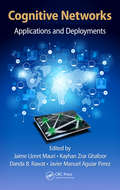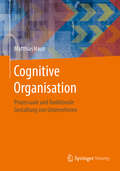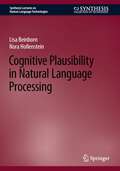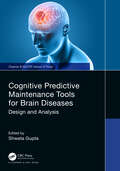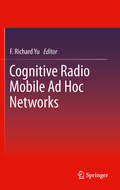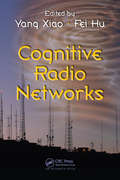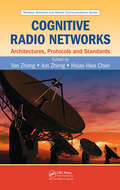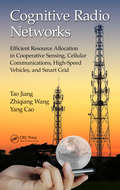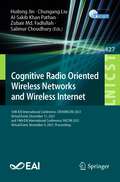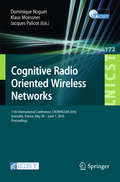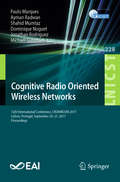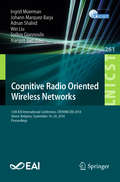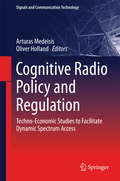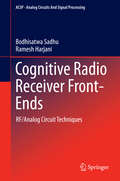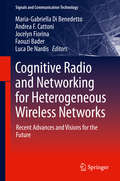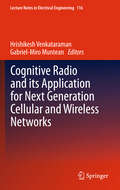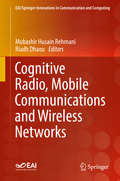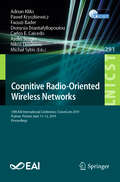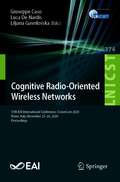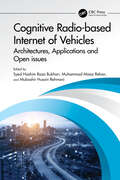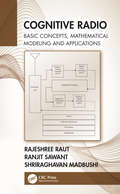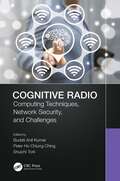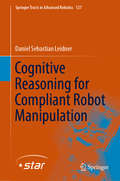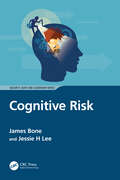- Table View
- List View
Cognitive Networks: Applications and Deployments
by Danda B. Rawat Jaime Lloret Mauri Kayhan Zrar Ghafoor Javier Manuel Aguiar PerezA cognitive network makes use of the information gathered from the network in order to sense the environment, plan actions according to the input, and make appropriate decisions using a reasoning engine. The ability of cognitive networks to learn from the past and use that knowledge to improve future decisions makes them a key area of interest for
Cognitive Neuroscience of Natural Language Use
by Roel M. WillemsWhen we think of everyday language use, the first things that come to mind include colloquial conversations, reading and writing e-mails, sending text messages or reading a book. But can we study the brain basis of language as we use it in our daily lives? As a topic of study, the cognitive neuroscience of language is far removed from these language-in-use examples. However, recent developments in research and technology have made studying the neural underpinnings of naturally occurring language much more feasible. In this book a range of international experts provide a state-of-the-art overview of current approaches to making the cognitive neuroscience of language more 'natural' and closer to language use as it occurs in real life. The chapters explore topics including discourse comprehension, the study of dialogue, literature comprehension and the insights gained from looking at natural speech in neuropsychology.
Cognitive Organisation: Prozessuale und funktionale Gestaltung von Unternehmen
by Matthias HaunDie in dem Buch beschriebenen Methoden und Techniken sichern Unternehmen den Entwicklungsvorsprung, der ben#65533;tigt wird, um mit hoher Innovations- und Zukunftssicherheit in organisatorischer und technologischer Hinsicht auf dynamischen M#65533;rkten zu bestehen. Der innovative Ansatz stellt die Begriffe Kognition, Organisation, Wissen und Technologie in den Mittelpunkt. Mit Hilfe der wissensbasierten, handlungsorientierten und simulationsvalidierten Methodik k#65533;nnen innovative Unternehmen als kognitive, wandelbare Organisationen entwickelt werden.
Cognitive Plausibility in Natural Language Processing (Synthesis Lectures on Human Language Technologies)
by Lisa Beinborn Nora HollensteinThis book explores the cognitive plausibility of computational language models and why it’s an important factor in their development and evaluation. The authors present the idea that more can be learned about cognitive plausibility of computational language models by linking signals of cognitive processing load in humans to interpretability methods that allow for exploration of the hidden mechanisms of neural models. The book identifies limitations when applying the existing methodology for representational analyses to contextualized settings and critiques the current emphasis on form over more grounded approaches to modeling language. The authors discuss how novel techniques for transfer and curriculum learning could lead to cognitively more plausible generalization capabilities in models. The book also highlights the importance of instance-level evaluation and includes thorough discussion of the ethical considerations that may arise throughout the various stages of cognitive plausibility research.
Cognitive Predictive Maintenance Tools for Brain Diseases: Design and Analysis (Chapman & Hall/CRC Internet of Things)
by Shweta GuptaThis book involves the design, analysis, and application of various cognitive predictive maintenance tests with the help of tools like vibration analysis, ultrasonic analysis, infrared analysis, oil analysis, laser-shaft alignment, and motor circuit analysis in the prediction of various cognitive diseases such as epilepsy, Parkinson’s disease, Alzheimer’s disease, and depression. These are needed since there are no proper medical tests available to predict these diseases in remote areas at an early stage. Various emerging technologies are analyzed for the design of tests. Key features: Incorporates innovative processes for treating cognitive diseases. Early and exact identification and treatment strategies are incorporated. Future technologies like artificial intelligence, machine learning, the IoT, and data science are used to find solutions. Analysis with existing cognitive disease solutions is incorporated and simulations provided. The novelty of the book lies in the accurate prediction of cognitive diseases. Encompassing future technologies and various communication protocols or devices available for cognitive diseases for the design of new equipment are an outcome of the book. Various parameters like power consumption, productivity, and safety should be taken into account during the analysis, design, and application of a product. The book could well be added to the curriculum of medical colleges and biomedical engineering students. Possible vendors include biomedical research centers like Biotechnika and the Indian Council of Medical Research (ICMR). It would be a breakthrough for biomedical companies to launch their new products.
Cognitive Radio Mobile Ad Hoc Networks
by F. Richard YuCognitive radios (CR) technology is capable of sensing its surrounding environment and adapting its internal states by making corresponding changes in certain operating parameters. CR is envisaged to solve the problems of the limited available spectrum and the inefficiency in the spectrum usage. CR has been considered in mobile ad hoc networks (MANETs), which enable wireless devices to dynamically establish networks without necessarily using a fixed infrastructure. The changing spectrum environment and the importance of protecting the transmission of the licensed users of the spectrum mainly differentiate classical MANETs from CR-MANETs. The cognitive capability and re-configurability of CR-MANETs have opened up several areas of research which have been explored extensively and continue to attract research and development. The book will describe CR-MANETs concepts, intrinsic properties and research challenges of CR-MANETs. Distributed spectrum management functionalities, such as spectrum sensing and sharing, will be presented. The design, optimization and performance evaluation of security issues and upper layers in CR-MANETs, such as transport and application layers, will be investigated.
Cognitive Radio Networks
by Ian MuehlenhausFueled by ongoing and increasing consumer demand, the explosive growth in spectrum-based communications continues to tax the finite resources of the available spectrum. One possible solution, Cognitive Radio Network (CRN), allows unlicensed users opportunistic access to licensed bands without interfering with existing users. Although some initial s
Cognitive Radio Networks: Architectures, Protocols, and Standards
by Yan Zhang Jun Zheng Hsiao-Hwa ChenWhile still in the early stages of research and development, cognitive radio is a highly promising communications paradigm with the ability to effectively address the spectrum insufficiency problem. Written by those pioneering the field, Cognitive Radio Networks: Architectures, Protocols, and Standards offers a complete view of cognitive radio-incl
Cognitive Radio Networks: Efficient Resource Allocation in Cooperative Sensing, Cellular Communications, High-Speed Vehicles, and Smart Grid
by Tao Jiang Yang Cao Zhiqiang WangResource allocation is an important issue in wireless communication networks. In recent decades, cognitive radio-based networks have garnered increased attention and have been well studied to overcome the problem of spectrum scarcity in future wireless communication systems. Many new challenges in resource allocation appear in cognitive radio-based networks. This book focuses on effective resource allocation solutions in several important cognitive radio-based networks, including opportunistic spectrum access networks, cooperative sensing networks, cellular networks, high-speed vehicle networks, and smart grids.
Cognitive Radio Oriented Wireless Networks and Wireless Internet: 16th EAI International Conference, CROWNCOM 2021, Virtual Event, December 11, 2021, and 14th EAI International Conference, WiCON 2021, Virtual Event, November 9, 2021, Proceedings (Lecture Notes of the Institute for Computer Sciences, Social Informatics and Telecommunications Engineering #427)
by Zubair Md. Fadlullah Al-Sakib Khan Pathan Huilong Jin Chungang Liu Salimur ChoudhuryThis book constitutes the refereed post-conference proceedings of the 16th International Conference on Cognitive Radio Oriented Wireless Networks, CROWNCOM 2021, held in December 2021, and the 14th International Conference on Wireless Internet, WiCON 2021, held in November 2021. Due to COVID-19 pandemic the conferences were held virtually. The 18 full papers of CROWNCOM 2021 were selected from 40 submissions and present new research results and perspectives of cognitive radio systems for 5G and beyond 5G networks, big data technologies, such as storage, search and management. WiCON 2021 presents 7 papers covering topics ranging from technology issues to new applications and test-bed developments, especially focusing on next-generation wireless Internet, 5G, 6G, IoT, Industrial IoT, Healthcare IoT, and related methodologies.
Cognitive Radio Oriented Wireless Networks: 11th International Conference, CROWNCOM 2016, Grenoble, France, May 30 - June 1, 2016, Proceedings (Lecture Notes of the Institute for Computer Sciences, Social Informatics and Telecommunications Engineering #172)
by Jacques Palicot Dominique Noguet Klaus MoessnerThis book constitutes the thoroughly refereed conference proceedings of the 11th International Conference on Cognitive Radio Oriented Wireless Networks, CROWNCOM 2016, held in Grenoble, France, May 30 - April 1, 2016. The 62 revised full papers presented were carefully reviewed and selected from numerous submissions and cover the evolution of cognitive radio technology pertaining to 5G networks. The papers are clustered to topics on dynamic spectrum access/management, networking protocols for CR, modeling and theory, HW architecture and implementations, next generation of cognitive networks, standards and business models, emerging applications for cognitive networks.
Cognitive Radio Oriented Wireless Networks: 12th International Conference, CROWNCOM 2017, Lisbon, Portugal, September 20-21, 2017, Proceedings (Lecture Notes of the Institute for Computer Sciences, Social Informatics and Telecommunications Engineering #228)
by Jonathan Rodriguez Shahid Mumtaz Ayman Radwan Dominique Noguet Paulo Marques Michael GundlachThis book constitutes the thoroughly refereed conference proceedings of the 12th International Conference on Cognitive Radio Oriented Wireless Networks, CROWNCOM 2017, held in Lisbon, Portugal, in September 2017. The 28 revised full papers presented were carefully reviewed and selected from numerous submissions and cover the evolution of cognitive radio technology pertaining to 5G networks. The papers are clustered to topics on spectrum management; network management; trials, test beds, and tools; PHY and sensing; spectrum management.
Cognitive Radio Oriented Wireless Networks: 13th Eai International Conference, Crowncom 2018, Ghent, Belgium, September 18-20, 2019, Proceedings (Lecture Notes of the Institute for Computer Sciences, Social Informatics and Telecommunications Engineering #261)
by Wei Liu Johann Marquez-Barja Ingrid Moerman Adnan Shahid Spilios Giannoulis Xianjun JiaoThis book constitutes the refereed proceedings of the 13th EAI International Conference on Cognitive Radio Oriented Wireless Networks, CROWNCOM 2018, held in Ghent, Belgium, in September 2018. The 20 revised full papers were selected from 26 submissions. The papers are organized thematically in tracks: Experimental, Licensed Shared Access and Dynamic Spectrum Access, and PHX and Sensing.
Cognitive Radio Policy and Regulation: Techno-Economic Studies to Facilitate Dynamic Spectrum Access (Signals and Communication Technology)
by Arturas Medeisis Oliver HollandThis book offers a timely reflection on how the proliferation of advanced wireless communications technologies, particularly cognitive radio (CR) can be enabled by thoroughly-considered policy and appropriate regulation. It looks at the prospects of CR from the divergent standpoints of technological development and economic market reality. The book provides a broad survey of various techno-economic and policy aspects of CR development and provides the reader with an understanding of the complexities involved as well as a toolbox of possible solutions to enable the evolutionary leap towards successful implementation of disruptive CR technology or indeed any other novel wireless technologies. Cognitive Radio Policy and Regulation showcases the original ideas and concepts introduced into the field of CR and dynamic spectrum access policy over nearly four years of work within COST Action IC0905 TERRA, a think-tank with participants from more than 20 countries. The book's subject matter includes: * deployment scenarios for CR; * technical approaches for improved spectrum sharing; * economic aspects of CR policy and regulation; * impact assessment of cognitive and software-defined radio; and * novel approaches to spectrum policy and regulation for the age of CR. The book will interest researchers in the field of wireless communications, especially those working with standardization and policy issues, as well as industry and regulatory professionals concerned with radio spectrum management and the general development of wireless communications. Considerable complementary reference material such as power point slides and technical reports that illustrates and expands on the contents of the book is provided on the companion website to the book, found at http://www. cost-terra. org/CR-policy-book
Cognitive Radio Receiver Front-Ends: RF/Analog Circuit Techniques (Analog Circuits and Signal Processing #115)
by Bodhisatwa Sadhu Ramesh HarjaniThis book focuses on the architecture and circuit design for cognitive radio receiver front-ends. The authors first provide a holistic explanation of RF circuits for cognitive radio systems. This is followed by an in-depth exploration of existing techniques that can be utilized by circuit designers. Coverage also includes novel circuit techniques and architectures that can be invaluable for designers for cognitive radio systems.
Cognitive Radio and Networking for Heterogeneous Wireless Networks: Recent Advances and Visions for the Future (Signals and Communication Technology)
by Maria-Gabriella Di Benedetto Faouzi Bader Andrea F. Cattoni Jocelyn Fiorina Luca De NardisThis book, written by leading experts from academia and industry, offers a condensed overview on hot topics among the Cognitive Radios and Networks scientific and industrial communities (including those considered within the framework of the European COST Action IC0902) and presents exciting visions for the future. Examples of the subjects considered include the design of new filter bank-based air interfaces for spectrum sharing, medium access control design protocols, the design of cloud-based radio access networks, an evolutionary vision for the development and deployment of cognitive TCP/IP, and regulations relevant to the development of a spectrum sharing market. The concluding chapter comprises a practical, hands-on tutorial for those interested in developing their own research test beds. By focusing on the most recent advances and future avenues, this book will assist researchers in understanding the current issues and solutions in Cognitive Radios and Networks designs.
Cognitive Radio and its Application for Next Generation Cellular and Wireless Networks (Lecture Notes in Electrical Engineering #116)
by Gabriel-Miro Muntean Hrishikesh VenkataramanThis book provides a broad introduction to Cognitive Radio, which attempts to mimic human cognition and reasoning applied to Software Defined Radio and reconfigurable radio over wireless networks. It provides readers with significant technical and practical insights into different aspects of Cognitive Radio, starting from a basic background, the principle behind the technology, the inter-related technologies and application to cellular and vehicular networks, the technical challenges, implementation and future trends. The discussion balances theoretical concepts and practical implementation. Wherever feasible, the different concepts explained are linked to application of the corresponding scheme in a particular wireless standard. This book has two sections: the first section begins with an introduction to cognitive radio and discusses in detail various, inter-dependent technologies such as network coding, software-based radio, dirty RF, etc. and their relation to cognitive radio. The second section deals with two key applications of cognitive radio - next generation cellular networks and vehicular networks. The focus is on the impact and the benefit of having cognitive radio-based mechanisms for radio resource allocation, multihop data transmission, co-operative communication, cross-layer solutions and FPGA-level framework design, as well as the effect of relays as cognitive gateways and real-time, seamless multimedia transmission using cognitive radio.
Cognitive Radio, Mobile Communications and Wireless Networks (EAI/Springer Innovations in Communication and Computing)
by Mubashir Husain Rehmani Riadh DhaouThis book provides an overview of the latest research and development of new technologies for cognitive radio, mobile communications, and wireless networks. The contributors discuss the research and requirement analysis and initial standardization work towards 5G cellular systems and the capacity problems it presents. They show how cognitive radio, with the capability to flexibly adapt its parameters, has been proposed as the enabling technology for unlicensed secondary users to dynamically access the licensed spectrum owned by legacy primary users on a negotiated or an opportunistic basis. They go on to show how cognitive radio is now perceived in a much broader paradigm that will contribute to solve the resource allocation problem that 5G requirements raise. The chapters represent hand-selected expanded papers from EAI sponsored and hosted conferences such as the 12th EAI International Conference on Mobile and Ubiquitous Systems, the 11th EAI International Conference on Heterogeneous Networking for Quality, Reliability, Security and Robustness, the 10th International Conference on Cognitive Radio Oriented Wireless Networks, the 8th International Conference on Mobile Multimedia Communications, and the EAI International Conference on Software Defined Wireless Networks and Cognitive Technologies for IoT.
Cognitive Radio-Oriented Wireless Networks: 14th EAI International Conference, CrownCom 2019, Poznan, Poland, June 11–12, 2019, Proceedings (Lecture Notes of the Institute for Computer Sciences, Social Informatics and Telecommunications Engineering #291)
by Faouzi Bader Adrian Kliks Paweł Kryszkiewicz Dionysia Triantafyllopoulou Carlos E. Caicedo Aydin Sezgin Nikos Dimitriou Michał SybisThis book constitutes the refereed proceedings of the 14th International Conference on Cognitive Radio-Oriented Wireless Networks, CROWNCOM 2019, held in Poznan, Poland, in June 2019. The 30 revised full papers were selected from 48 submissions and present a large scope of research topic also covering IoT in 5G and how cognitive mechanisms shall help leveraging access for numerous devices; mmWave and how specific propagation and operation in these bands bring new sharing mechanisms ; how resource allocation amongst bands (including offload mechanisms) shall be solved. The key focus will be on how rich data analysis can improve the delivery of above defined services.
Cognitive Radio-Oriented Wireless Networks: 15th EAI International Conference, CrownCom 2020, Rome, Italy, November 25-26, 2020, Proceedings (Lecture Notes of the Institute for Computer Sciences, Social Informatics and Telecommunications Engineering #374)
by Liljana Gavrilovska Luca De Nardis Giuseppe CasoThis book constitutes the refereed proceedings of the 15th International Conference on Cognitive Radio-Oriented Wireless Networks, CROWNCOM 2020, held in Rome, Italy, in November 2020. Due to COVID-19 pandemic the conference was held virtually. The 13 revised full papers were selected from 28 submissions and present all major technical aspects related to cognitive radio and networks. The papers are organized in four sessions: spectrum sensing and environment awareness; resource sharing and optimization; verticals and applications; business models and spectrum management.
Cognitive Radio-based Internet of Vehicles: Architectures, Applications and Open issues
by Mubashir Husain Rehmani Muhammad Maaz Rehan Syed Hashim Raza BukhariThe incorporation of Cognitive Radio (CR) into the Internet of Vehicles (IoV) has emerged as the Intelligent Transportation System (ITS). Section 1 covers the aspects of cognitive radio when it provides support to IoV. The challenges which limit the performance of ITS are highlighted in this chapter. These issues include unreliable delivery, the dynamic topology of IoV, routing overhead, scalability, and energy, to name a few. The issues can be considered as future research directions for a promising intelligent transportation system. Machine learning (ML) is a promising discipline of Artificial Intelligence (AI) to train the CR-based IoV system so that it can make decisions for improved spectrum utilization. The ML-enabled IoV systems can better adapt to the dynamically changing environment. Section 2 covers the applications of ML techniques to the CR-IoV systems and highlights their issues and challenges. Section 3 covers the examination of ML in conjunction with Data Science applications which further widens the scope of the readership. In CR-IoV, ML and Data Science can be collaboratively used to further enhance road safety through inter-vehicle, intra-vehicle, and beyond-vehicle networks.The channel switching and routing overhead is an important issue in CR-based IoVs. To minimize the channel switching and routing overheads, an effective scheme has been presented in Section 4 to discuss the promising solutions and performance analysis. Meanwhile, IoV communication is a highly time-sensitive application that requires that the vehicles should be synchronized. The time synchronization in IoVs has been highlighted in Section 5 to elaborate further on the critical metrics, challenges, and advancements in synchronization of IoVs. As the vehicles exchange data using wireless channels, they are at risk of being exposed to various security threats. The eavesdropping, identity exposure, message tampering, or sinkhole attack to name a few. It needs time to discuss the security issues and their countermeasures to make the CR-IoV attack resilient. The last section of the book highlights the security issues and maintaining the quality of service (QoS) of the CR-based IoVs which concludes the book.Key features The architecture and applications of Intelligent Transportation System (ITS) in CR-IoVs. The overview of ML techniques and their applications in CR-IoVs. The ML applications in conjunction with Data Science in CR-IoVs. A minimized channel switching and routing (MCSR) technique to improve the performance of CR-IoVs. Data Science applications and approaches to improve the inter and intra-vehicle communications in CR-IoVs. The classification of security threats and their countermeasures in CR-IoVs. The QoS parameters and their impact on the performance of the CR-IoV ecosystem. The targeted audience of this book can be undergraduate and graduate-level students, researchers, scientists, academicians, and professionals in the industry. This book will greatly help the readers to understand the application scenarios, the issues and challenges, and the possible solutions. All the chapters highlight the future research directions that can be taken as research topics for future research.
Cognitive Radio: Basic Concepts, Mathematical Modeling and Applications
by Rajeshree Raut Ranjit Sawant Shriraghavan MadbushiGlobally considered as one of the key technologies in the field of wireless communications, cognitive radio has the capability to solve the issues related to radio spectrum scarcity with the help of dynamic spectrum allocation. It discusses topics including software defined radio architecture, linear predictive coding, variance fractal compression, optimal Codec design for mobile communication system, digital modulation techniques, spectrum sensing in cognitive radio networks and orthogonal frequency division multiplexing in depth. The text is primarily written for senior undergraduate and graduate students, in learning experimental techniques, designing and implementing models in the field wireless communication.
Cognitive Radio: Computing Techniques, Network Security and Challenges
by Budati Anil KumarThe scarcity of radio spectrum is one of the most urgent issues at the forefront of future network research that is yet to be addressed. To address the problem of spectrum usage efficiency, the cognitive radio (CR) concept was proposed. The challenges of employing CRs include ensuring secure device operations and data transmission with advanced computing techniques. Successful development of CR systems will involve attainment of the following key objectives: Increasing the rate and capacity of CR-based networks How the power is utilized in CR hardware devices with CMOS circuits How the framework is needed in complex networks Vedic multipliers on CR networks Spatial analysis and clustering methods for traffic management To transmit a large volume of data like video compression Swarm optimization algorithms Resource sharing in peer-to-peer networking This book gathers the latest research works focusing on the issues, challenges, and solutions in the field of Cognitive Radio Networks, with various techniques. The chapters in this book will give solutions to the problems that Industry 4.0 faces, and will be an essential resource for scholars in all areas of the field.
Cognitive Reasoning for Compliant Robot Manipulation (Springer Tracts in Advanced Robotics #127)
by Daniel Sebastian LeidnerIn order to achieve human-like performance, this book covers the four steps of reasoning a robot must provide in the concept of intelligent physical compliance: to represent, plan, execute, and interpret compliant manipulation tasks. A classification of manipulation tasks is conducted to identify the central research questions of the addressed topic.It is investigated how symbolic task descriptions can be translated into meaningful robot commands.Among others, the developed concept is applied in an actual space robotics mission, in which an astronaut aboard the International Space Station (ISS) commands the humanoid robot Rollin' Justin to maintain a Martian solar panel farm in a mock-up environment
Cognitive Risk (Security, Audit and Leadership Series)
by James Bone Jessie H LeeCognitive Risk is a book about the least understood but most pervasive risk to mankind – human decision-making. Cognitive risks are subconscious and unconscious influence factors on human decision-making: heuristics and biases. To understand the scope of cognitive risk, we look at case studies, corporate and organizational failure, and the science that explains why we systemically make errors in judgment and repeat the same errors. The book takes a multidisciplinary and pedestrian stroll through behavioral science with a light touch, using stories to explain why we consistently make cognitive errors that not only increase risks but also simultaneously fail to recognize these errors in ourselves or our organizations. This science has deep roots in organizational behavior, psychology, human factors, cognitive science, and behavioral science all influenced by classic philosophers and enabled through advanced analytics and artificial intelligence. The point of the book is simple. Humans persist with bounded rationality, but as the speed of information, data, money, and life in general accelerates, we will need the right tools to not only keep pace but to survive and thrive. In light of all these factors that complicate risk, the book offers a foundational solution. A cognitive risk framework for enterprise risk management and cyber security. There are five pillars in a cognitive risk framework with five levels of maturity, yet there is no universally prescribed maturity level. It is more a journey of different paths. Each organization will pursue its own path, but the goal is the same – to minimize the errors that could have been avoided. We explain why risks are hard to discuss and why we systematically ignore the aggregation of these risks hidden in collective decision-making in an organization. The cognitive risk framework is a framework designed to explore the two most complex risks organizations face: uncertainty and decision-making under uncertainty. The first pillar is cognitive governance, which is a structured approach for institutionalizing rational decision-making across the enterprise. Each pillar is complimentary and builds on the next in a succession of continuous learning. There is no endpoint because the pillars evolve with technology. Enterprise risk is a team effort in risk intelligence grounded in a framework for good decision-making. We close with a call to become designers of risk solutions enabled by the right technology and nurtured by collaboration. We hope you enjoy the book with this context.
